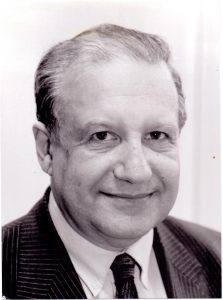Joe Rogaly, the inside outsider
FT writer whose trenchant views intrigued business
By Geoffrey Owen, former editor, Financial Times
June 25, 2013
Joe Rogaly, who died this week at the age of 77, was one of the most talented and influential journalists of his generation. In his “Society Today” column in the Financial Times, which began in 1969 and continued until the late 1970s, he provided an insightful and often controversial commentary on some of the most important social issues of the period.
The introduction of the column was an innovation for the FT, taking the paper’s coverage into areas of national life that had previously been neglected. A random selection of his articles – “Ministers break a promise on secrets”, “Mr Carr’s new morality for the workers” (on a failed attempt by the Heath government to reform industrial relations), “Paying for a better pension deal” – indicates the range of topics that he covered and his generally liberal (though by no means ideological) approach.
Moving to England in 1959, he worked for six years at The Economist before joining the FT in 1965. Two years later he was appointed Washington correspondent, and in the four years he spent in that post he greatly enhanced the status of the FT in the US. He wrote colourful articles on the traumatic events of 1968, including the assassinations of Martin Luther King and Robert Kennedy, and the escalating Vietnam War.
After Washington he served as political editor and managing editor, but it was as a columnist that he became best known and justly celebrated, attracting many readers from outside the business community who were intrigued and sometimes irritated by his trenchant views.
He won fame for his coverage – later turned into a book – of the bitter strike, lasting from 1976 to 1978, at the Grunwick Film Processing Laboratories in Willesden. The dispute was over trade union recognition for the workforce of mostly female immigrants from East Africa. The accompanying violence on the picket line – there were over 500 arrests – was widely seen as damaging to the trade union movement, helping pave the way for Margaret Thatcher’s victory in the 1979 election.
Rogaly also wrote a book on electoral reform, Parliament for the People, and an unpublished book on Father Trevor Huddleston, following a three-month stay in Tanzania.
Rogaly left the editorial side of the paper in 1984 to work in management, principally as chief executive of FT Business Information, a research service for the business community. He retired from the FT in 1995.
Shortly after retirement he was diagnosed with Parkinson’s disease. He responded with great courage, determination and good humour. From his home in Shalbourne in Wiltshire he played a full part in village life. His wife Susan was deeply committed to church life and Joe gave this his full support, co-editing the church magazine with typical panache. Encouraged by his son Ben, he also volunteered his journalistic skills to mailings by a Jewish organisation, Jews for Justice for Palestinians.
After a successful brain operation in 2008 Rogaly’s mobility improved, and he remained mentally active and lucid until his death. He took up painting, was an active gardener, and was keenly involved in the activities of his children and grandchildren. His son describes him as “inspirational, determined and mischievous”.
Colleagues remember Joe with affection, a brilliant journalist but also a gentle and considerate colleague, always ready to advise and encourage less experienced writers. One recalled: “Joe taught me more about the craft of journalism than anybody I’ve ever known, in just six months”.
His wife Susan (nee Baring) died in 2010. He is survived by a son and three daughters, and nine grandchildren.
From Joe’s son
Ben Rogaly
By email, June 28, 2013
Dad was a secular, though not entirely atheist, Jew, with a spirituality that continued to transform into his last days when he enjoyed the mystery of seed germination and plant growth in his small but almost perfect garden on the edge of a car park in the Gloucestershire town of Nailsworth. He and Mum wanted their four children to have old testament names (Ben, Sarah, Rachel and Jessica). Dad could not help his Jewishness coming to us through food – his Aunt Lena’s potato latkes were legendary – and we identified it with warmth, humour and a certain kind of neurosis that formed part of our family life. In an interview I did with Dad about his life in 2004 he told me he had never been a Zionist and when he no longer felt able to write articles for the FT I brought to his attention a call from JfJfP for a volunteer to help pull together and send out their regular mailings. It was an activity to which he gave his all each month, sometimes needing assistance from another family member, and which gave him immense satisfaction. He only stopped when his illness made it impossible to get the mailings out on time.


